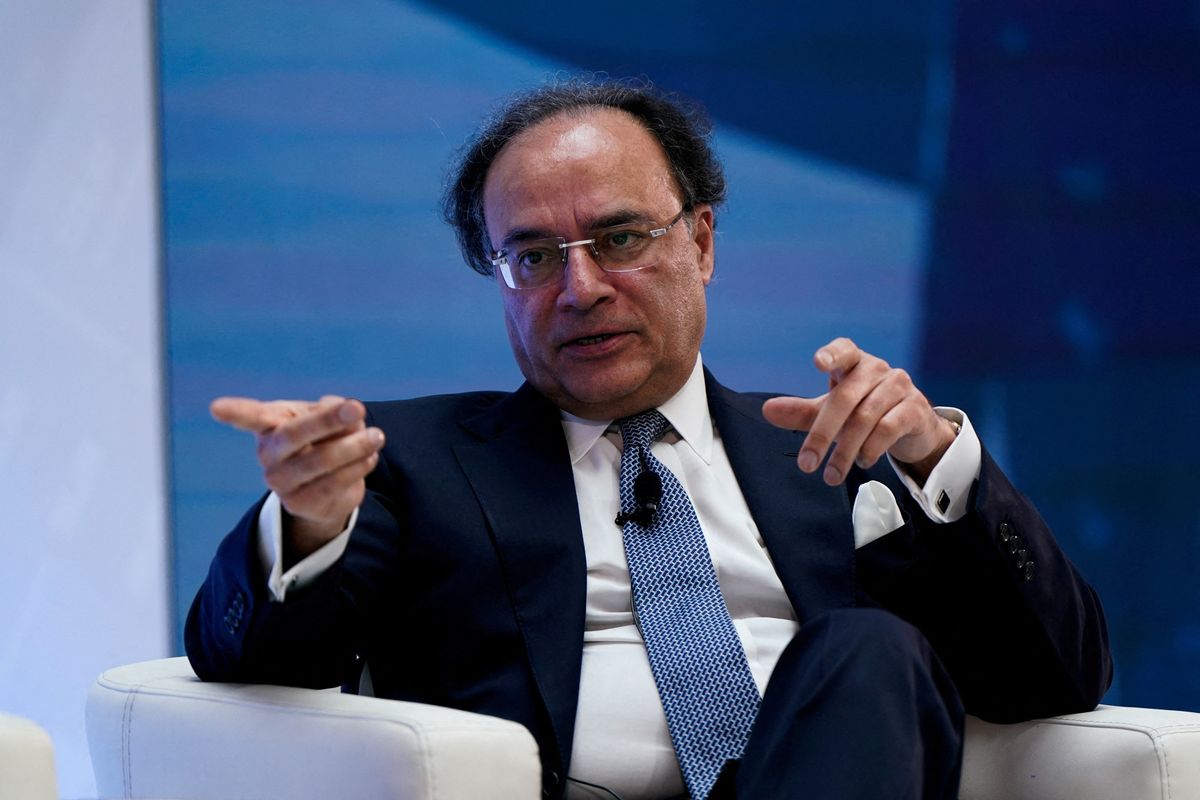Pakistan urges de-escalation with India but warns of World Bank move over Indus Waters Treaty
Finmin Aurangzeb says Pakistan hopes to ease tensions with India but warns it may approach World Bank over one-sided IWT suspension

Gaitty Ara Anis
Correspondent-USA
Gaitty Ara Anis is a seasoned multimedia journalist based in Washington, D.C., she specializes in digital content creation, including writing and video production. Currently, she represents Nukta as its correspondent in the USA. She has been previously associated with Voice of America, Dawn, CNBC, PTV World and Geo News over the past twenty years.

Pakistan Finance Minister Muhammad Aurangzeb participates in a panel titled “Navigating an Uncertain World” during the 2025 annual IMF/World Bank Spring Meetings in Washington, D.C., U.S., April 25, 2025.
Reuters
Pakistan hopes for an easing of tensions with India following a deadly attack on tourists in Indian-administered Kashmir, but has warned that it may approach the World Bank over a key water-sharing treaty if the situation worsens, the country’s finance minister said.
Finance Minister Muhammad Aurangzeb shared the government's position during a press conference in Washington, D.C., at the end of his visit for the International Monetary Fund’s (IMF) Spring Meetings.
Answering a question, Aurangzeb said Pakistan remains hopeful that tensions with India will ease soon.
However, he warned that India’s unilateral decision to put the Indus Waters Treaty in abeyance could force Pakistan to take the matter to the World Bank, which has served as the treaty’s arbitrator since its signing in the 1960s.
Aurangzeb welcomed remarks made by U.S. President Donald Trump, who recently said he believed Pakistan and India would resolve their issues through dialogue. The U.S. State Department has said Washington is monitoring developments closely.
Relations between the two nuclear-armed neighbors have deteriorated sharply following the attack in Indian-administered Kashmir’s Pahalgam area, where 27 tourists were killed. New Delhi has blamed Islamabad for the assault, a charge Pakistan strongly denies.
Turning to Pakistan’s economy, Aurangzeb said the country had made significant progress since signing a $7 billion IMF program, approved in September 2024.
The 37-month Extended Fund Facility (EFF) arrangement is aimed at supporting economic stabilization and recovery. It also seeks to strengthen macroeconomic stability, address structural challenges, and create conditions for stronger and more inclusive growth.
The finance minister stressed the need for substantial structural reforms and said Pakistan was on the right path, pointing to an increase in exports as a positive sign.
During his visit, Aurangzeb also held sideline meetings with key officials to shore up financial support for Pakistan’s economy.
He met Chinese Finance Minister Lan Fo'an, requesting an extension of guaranteed debt repayment and an expansion of the $4.3 billion currency swap agreement. China assured the rollover of Pakistan's $4 billion IMF cash deposit.
Pakistan also sought to reschedule Exim Bank debt maturing during the IMF program and expand the bilateral currency swap.
In response to a question from Nukta, Aurangzeb confirmed that Pakistan had asked to reschedule Exim Bank debt payments due until September 2027.
He said Pakistan had requested a CNY 10 billion increase — roughly $1.4 billion — to the currency swap and was seeking Asian Development Bank support to enter China’s bond market.
Aurangzeb added that Pakistan plans to issue yuan-denominated Panda bonds in June, aiming to raise $200 million from Chinese investors. He said Pakistan hopes to leverage its recent sovereign rating upgrades to expand its presence in Chinese capital markets.
On domestic issues, Aurangzeb stressed the need for stricter administrative measures to tackle inflated prices of everyday items.
He said that although the inflation rate had dropped significantly over the past year, the public had not yet seen corresponding relief. He vowed action against those responsible for not passing on price reductions to consumers.
Aurangzeb also pointed to a record increase in remittances and, for the first time, a rise in vehicle exports to African countries as positive economic indicators.
He expressed optimism that newly signed mineral and mining agreements — especially for copper, which is in high demand for electric vehicle manufacturing — would boost Pakistan’s export earnings.
Responding to a question about newly imposed 29 percent tariffs on Pakistani exports to the United States, Aurangzeb said a delegation would soon visit Washington to negotiate the issue.
He expressed confidence that the dispute would be resolved, noting that Pakistan already applies low tariffs on U.S. imports.
Aurangzeb also hinted at new support measures for Pakistan’s growing freelancer community, particularly those working in the IT sector.
He said the government was working to engage prominent money transfer platforms, such as PayPal, to facilitate freelancers’ international payments.










Comments
See what people are discussing